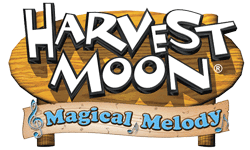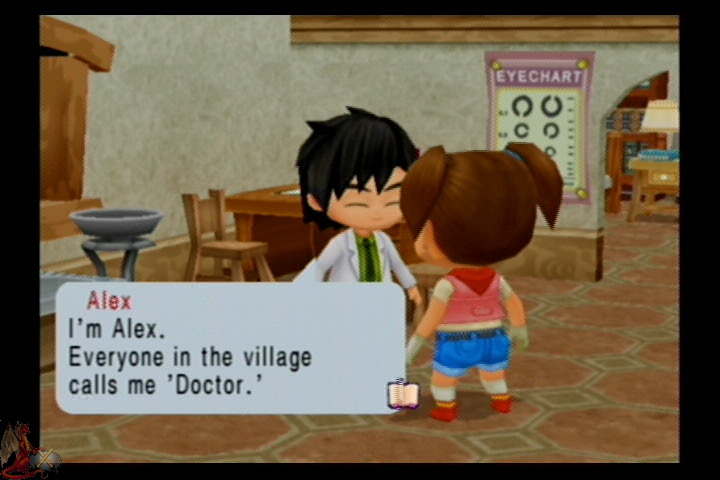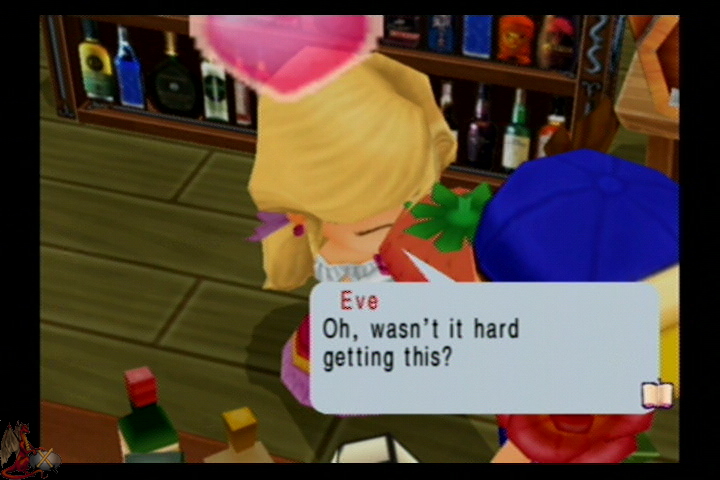|
|

|
FARMING SYSTEM
|

|
INTERACTION
|

|
ORIGINALITY
|

|
STORY
|

|
MUSIC & SOUND
|

|
VISUALS
|

|
CHALLENGE
|
Pleasantly Easy
|
COMPLETION TIME
|
20 - 40 hours
|
|
OVERALL
4/5
|
Rating definitions
|
|
|
Though not as well known as some other, more popular RPG series, there are almost as many Harvest Moon games as there are Final Fantasy titles, and it outnumbers the Zelda franchise. So why are more people saving the world instead of farming? It is likely a question which has no answer, but there is a simple answer as to whether the newest iteration, Harvest Moon: Magical Melody, is a solid addition to the series, and the answer is thankfully a "yes." With a far-reaching and enjoyable farming and social system, a plain but effective story, and many different ways to accomplish the goal at hand, there's little to say about the game that doesn't bubble over with simple amusements and a solid helping of enjoyment.
The story is simple but gets the job done: rescue the Harvest Goddess from her self-imposed exile by collecting various musical notes, which when put together will create instruments and play a magical melody, wooing the Goddess from her stone statue. Notes are acquired in a variety of ways. Some are as simple as standing around doing nothing, or attending one of the numerous festivals. Some are more complicated, unattainable without an elaborate chain of events, such as the various notes relating to spouse and family. While most of the animals, people, and activities are not new to the Harvest Moon series, the idea of acquiring notes is a great spin on the game and adds a lot of fun moments, as those who previously may not have branched out are encouraged to do a far larger variety of activities, and be socially active within the community while still enjoying simpler activities.
When beginning the game, the character (a boy, or a girl depending on the mood of the player) has a choice of three lots. One is large but infertile; one is small but well-placed; the third is between the two sizes and very fertile. It must be remembered that the farmer has a set amount of stamina and loses it with every action performed. If overworked, the character will pass out and not awaken until the next day; stamina can be restored with a variety of foods, either eaten raw, cooked in recipes, or purchased. Each of the four seasons have a different set of seeds to plant. Every bag of seeds will cover a three by three area, though alternative planting patterns may yield better results. A farmer can also plant trees, and in some seasons flowers or herbs. Each type of seed will take a different length of time to grow. Some plants can be harvested repeatedly, while others can only be picked once. After that, it's time to check the toolbox, because a good farmer is going to need everything in there and more to get the farm, and the town around, to fully prosper. If a tool is foreign to the user, a brief explanation both within the menu and inside an in-game book will help the player along. The tools available at the start include a hoe, hammer, watering can, sickle, axe, and fishing rod. These tools gain experience as they are used and can either be upgraded with an ore once a blacksmith moves into town, or the fully completed upgrade can be purchased from the junk shop. Additional tools such as a brush or milker, or devices such as a mayo or butter maker, can be purchased but those come much later.
 New Face, Similar Personality
New Face, Similar Personality
|
|
While having animals is entirely optional, it adds important revenues to the farm, especially when winter sets in and nothing will grow. A barn can hold cows, sheep, and horses. Cows, when fully grown, can be milked daily, while adult sheep can be shorn once a week. There are three qualities to each product, with the highest being the most valuable. In addition, milk can be changed into butter or cheese with the right machines, and wool can be turned into yarn. Horses do not give any specific product, but can be ridden around town and in competitions. A horse has a training meter in addition to it's love meter, and the more stars the meter has filled the more obedient the horse is to your commands. Fodder to feed these animals can be acquired either by purchasing it, or by growing grass and cutting it with the sickle. Chickens can be raised in a coop, and like cows are fed with either corn processed in a windmill or bought at the store. Eggs also come in three varieties and can be turned into mayonnaise with the right machine.
If a farmer wishes to do neither of these, that's also okay! Money can still be made in other ways. Fishing is a lucrative practice, and befriending the local dolphin allows you to fish on a small island where unique types of fish can be found. A bonfire kit (a fancy way of saying matches) is provided at the beginning of the game and can be used to cook fish. When eaten, they restore stamina, so fishing can continue throughout the day. Alternatively, there are two underground mines where, equipped wth a hammer and a hoe, anyone can dig up a variety of ores, gems, and clay. These can also be sold, or given to townspeople to impress them. These ores are needed to upgrade a tool once it has gained enough experience. All things considered, there is never a boring moment when farming, no matter what activity is desired.
A farmer should also take time out of their busy schedule to interact with the town around them. Each person and animal has a 'love meter', which indicates their friendliness towards the main character. It starts out at zero hearts but slowly rises as daily interaction occurs. Gems can be turned into fancy jewelry, also useful as gifts to charm the locals. Each person has distinct likes and dislikes, as well as a birthday, so getting to know the personalities of each townsfolk is very important.
The largest downside of the game is the music and sound. The tracks have scratchy portions, sections which lag, and other problems. They also suffer the same problem all the other Harvest Moon games have: too few tracks means music is constantly being overplayed and it becomes irritating very quickly. The sound effects are downright annoying, and they drown out any music playing completely. The small voice bits are also terribly done, and activate every single time a person is spoken to, in an increasingly annoying fashion. The lack of variety has almost become a staple to the series but the problems with the buggy sound and terrible voice bits leave much to be desired. The graphics suffer from a similar problem. While on the surface, everything looks bright and cheerful, there are a few graphical glitches which become apparent rather quickly, including one which can be used to easily switch floors in the mine. While they don't detract from the game, a combination of poor thought into both these areas does detract from an otherwise well done game.
Another spot, besides the farming and social system, where Magical Melody truly shines is the menu system. The menus are numerous, but they're laid out in a logical sense and all the information is not only important, but necessary to run the farm smoothly. The Belongings menu shows what is in your rucksack, the time, date, and weather. The Farm menu shows information about the main character, the pets and their love meters, and basic information about the farm including how many plots of land are owned, livestock owned, and general supplies owned. The Animals menu shows cows, sheep, chickens, and horses in their own tabs and their love meters; pushing the X button in these menus allows you to sort each animal category by how much they love you, rather than the season they were bought/born. The Shipped Items menu breaks down into crop, fish, food, and other tabs, which can be sorted by the number shipped rather than the seasonal order initially shown. The village map is an overview of who, and what, is where. When the player is outside, it will show who is outside as well. As more people move into the town, the map will be updated with their locations. Notes is a breakdown of the collection of 100 notes in the game. At first, notes appear greyed out, with only their names to hint at what may unlock them. As notes are completed, they are colored in and a brief description tells how the note was acquired. Next is the Villagers menu, where the love meters of both the townspeople and the local wild animals are listed. Pressing X in this menu reorganizes the list to how much each person/animal loves you. This is a very important menu as each bachelor and bachelorette will only fork over their note if they have a certain amount of affection for the player. Last is the Memo menu, divided into tabs marked records, books, dishes, and ?. Records shows the shipping of both the player and their rival Jamie from the previous day. Books explain how each tool and seed work to begin with, and fills out as books are read in the library to include encyclopedias on fish, plants, animals, and other useful information. Dishes is a list of the recipes which have been found, created, or given to the player. Finally, the ? shows various records, such as how deep into the mines they have gone, or how many weeds have been pulled. All this information comes in handy when planning strategies such as who to woo, what to plant, and which activities to pursue.
 Blonde Bombshell Waitress
Blonde Bombshell Waitress
|
|
Obviously, a text heavy game like Harvest Moon needs a thorough translation, and this game is no exception to that rule. While the localization is not flawless - there are a couple spacing problems, as well as a couple spelling and grammar errors - a very good job was done to ensure the vast amounts of conversation, information, and other necessary text was brought over with only a small margin of error. The game case states "Basic reading ability is needed to fully enjoy this game," and it is very true; it's nice to see that effort was put into getting the localization done right.
Depending on what activities the farmer engages in, the game may be laughably simple or a daily time crunch, but overall the game is on the easy side. That's not to say it's boring by any length, as there's tons to do besides farming and raising animals. Exploring the mines, building a social life, and bringing new citizens into the village are all vital parts of collecting the 100 notes total in the game. The credits roll for the first time at 50 notes, which will take a player around 20 hours to reach. To collect the next 50 notes, players will need to invest about another 15-20 hours to round up each and every one.
If nothing else, Magical Melody shows that innovation can be done even in a simple theme like farming. Had it not been for the poor presentation in the sound and graphics side of the game, it could have been a spectacular title. Instead, it slides in at good, with some improvements badly needed. That being said, there's no getting around the fact that this title is simply a really fun game, which cannot be described by any numbering system. For veterans to the Harvest Moon series as well as those who have never picked up a watering can in their life, this title is recommended to all. It may come as a surprise just how interesting a game it is.
Review Archives
|









